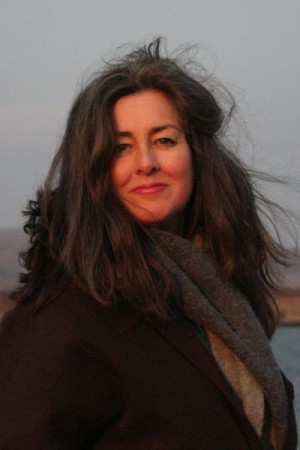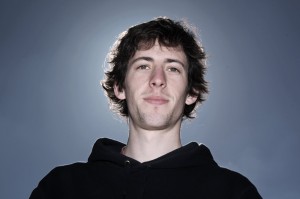What will the world look like in 2020? How will our actions today have influenced society, business, and the environment? The British Award-winning international author and environmental lawyer Polly Higgins came to talk about the emerging law of ecocide—or how a small action could have enormous benefits—during the workshop of the Environmental Working Group (EnWG) at Agora Budapest. The following interview was conducted by Mathieu Soete, Policy Officer on Sustainability and former EnWG speaker, during the Agora. It will be both published in the Golden Times and The AEGEEan.

Mathieu Soete: You just gave a workshop at Agora Budapest on ecocide. Can you tell us a bit about this session?
Polly Higgins: It was absolutely excellent! The Agora participants shared a real sense of excitement and engagement around the idea of international law and ECI in Europe. We had around 25-30 participants from all over Europe, which gave a very diverse crowd of students, asking lots of questions. It was fantastic to be able to engage with them on this important topic. Afterwards I also heard from people that the session really motivated them to become more active on environmental topics in AEGEE in the coming months.
Mathieu: This was your first experience with any big AEGEE event. What is your impression?
Polly Higgins: I loved it! As a student I was one of the first Erasmus students, going from Scotland to Utrecht in 1988. This really put me in touch with other cultures, but I would have loved to have the opportunity of meeting people like in AEGEE. Actually, come to think of it, I probably met some early AEGEE members while studying in Utrecht!
 Mathieu: What was the best moment for you at Agora Budapest?
Mathieu: What was the best moment for you at Agora Budapest?
Polly Higgins: Without a doubt, the dancing at the beginning of the closing plenary! I loved it, everybody was so full of energy, and it really set the tone for the rest of the evening. But also that short moment I was able to address the entire plenary. Speaking to those hundreds and hundreds of young, active Europeans is what our Eradicating Ecocide campaign is about: telling as many people as possible of the positive change they can achieve in our world.
Mathieu: We have heard a lot about ecocide in AEGEE. But remind us again, what is it exactly?
Polly Higgins: The term ecocide is really a contraction of “environmental genocide”. The name itself has been around since the 1970s—what I did, is giving it a legal definition, using commonly accepted elements from international law. Thus, ecocide is “the extensive damage to, destruction of, or loss of ecosystem(s) of a given territory, whether by human agency or by other causes, to such an extent that peaceful enjoyment by the inhabitants of that territory has been or will be severely diminished.”
Mathieu: As a lawyer, you used to represent many companies—not really an ecological job. How did you end up fighting for our earth, campaigning to end ecocide?
Polly Higgins: I was seeing some of the practices of corporations, and the quality of lawyers they could afford to get away with it… And I found myself thinking the earth is in need of a good lawyer as well. This realisation completely changed my life. I had identified a legal duty of care towards the planet, meaning that we have to make sure we are not causing it unreasonable harm, and I just could not get rid of that thought. Nobody was doing anything about it, so I decided I had to try and do it myself.

Mathieu: You are campaigning to make ecocide a crime, but why?
Polly Higgins: Our aim is to make ecocide the 5th International Crime Against Peace, alongside with genocide and war crimes. This will make it punishable in every country, either before national courts, or the International Criminal Court in The Hague. It puts a superior responsibility on CEOs and government leaders to align their companies and countries with sound environmental practices in order to prevent ecocide. Because this is the final aim: preventing future ecocide.
Mathieu: Will corporations not lobby hard against this?
Polly Higgins: On the contrary, they are supporting this. Many companies are greener in their thinking than in their actions, but mainstreaming new technologies is simply unaffordable in the current economic system. What the law of ecocide does, is create a level playing field. It rewards those companies who already take care of the environment, and gives incentives to those who are lagging behind. It also stabilises the markets in a sense, as it sends out long-term investment signals: We need to take better care of our environment, and this is not going to change anymore, so let’s invest in green technologies. As such, an international law of ecocide really has the potential to a green economy.

Mathieu: So we will need massive public support. Tell us, what is the current state of political and citizen initiatives to end ecocide?
Polly Higgins: Politically, a number of countries are really engaged, but we need world leaders to stand up and speak out in favour of making ecocide an international crime. So far, however, this has not happened. In sensitive topics like this, politicians always need a public mandate, which means they need to hear the voice of the people. This is what can give them the confidence to stand up. That is why we need citizen initiatives like the European Citizens’ Initiative (ECI) to show people’s support on this topic and push our leaders to speak up.
Mathieu: Barack Obama just got re-elected in the US. Are we going to see some initiative on ending ecocide from that side of the Atlantic anytime?
Polly Higgins: I think we will. America will want to be there in the new world. An international law of ecocide will give Obama the power to do what many of his supporters want—what he wants. Now he is being held back by Congress, but this can give him a mandate to speak for the people. Plus, he is a lawyer as well, so he knows that because of the majority voting of the Rome statute, the US do not have a veto in this matter, and American businesses will also have to adapt.
Mathieu: If all of this works out, what will your perfect world look like?
Polly Higgins: The perfect world for me is a world where we have peace, where we no longer fight over land. It is a world of abundance, with sustainable permaculture instead of today’s monoculture and industrial agriculture. With transition towns and decentralised energy generation, where education and health are free for all. In my perfect world, bees will be back in abundance, organic food will be the norm, and we will all be happier. And of course, students won’t have to pay such high fees to go to university.
Mathieu: Finally, what are some ways a member of AEGEE can contribute to making ecocide a crime in Europe?
Polly Higgins: There is a really easy way, which is to seed this out to everyone in your network. If every AEGEE member can put even ten other people on the WISH20 map, we will generate 130,000 new dots. When those people reach out to another ten, we can round the cape of a million people in no time. So go to the WISH20 site, put your action on the map, and invite all your friends to join you. This is more than just another petition, this is creating change in a big way. Or get involved in the ECI, and check out the Youth Matter tools on our website, written especially for you.
Mathieu: I really want to call on everyone to create the world they want to see. We now have the choice to sit back and watch the destruction of our planet, or stand up and be a voice for the earth. So please stand up and support WISH20 by mapping what we are doing. We need you to make this one big wish come true!
For more information and more ways to get involved, contact Prisca Merz (AEGEE-Passau) for the ECI, or Mathieu Soete (AEGEE-Leuven) for support to organise an action in your local.
Featured image by Dasha Onohova.

